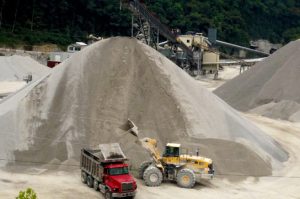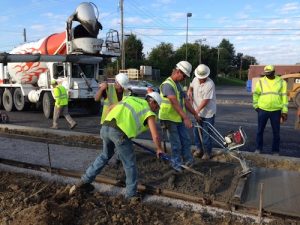The Allen Company Inc. is a road construction and asphalt paving contractor formed in 1939 that has built a reputation of growing and adapting to varying infrastructure needs in Central Kentucky. Today, the company’s operations include road construction, asphalt paving, operating three limestone quarries, concrete work, grading, drainage, site preparation, excavation, and utility work. With a vast array of work sites, the safety team for The Allen Company works diligently to communicate and implement an effective safety program with its employees.
The Allen Company has an impressive record with workplace safety, so KEMI sat down with the company’s safety director, Klinton Gilkerson, to learn more about how this family-owned company has built and maintained a top-notch safety program.
KEMI: What are some examples of the projects The Allen Company is currently working on in Kentucky?
Klinton: Currently, we are a contractor for the state and a subcontractor for East KY Power, Kentucky Utilities and Brasfield & Gorrie. We’re involved with a large project in Lexington on the corner of Nicholasville Road and Man O’ War where we did site preparation work such as laying pipes, completing crane and concrete work, paving, and working on the sewer. We’re also working with Kentucky Power to haul coal ash, so it’s safe to say that we are well diversified and do a little bit of everything.
KEMI: Describe your current position with The Allen Company and how it relates to workplace safety.
Klinton: My position at The Allen Company is also diversified. I am the safety manager but with my background in Department of Transportation compliance, I also manage our Trucking / Haul division. In the past five years our hauling/trucking division has grown as we’ve obtained 58 dump trucks (up from eight) and two tractor trailers. This includes a full function shop with two shifts and as many as six mechanics. I have a safety technician that goes out into the field daily and serves as my eyes and ears on the various work sites.
 KEMI: From your perspective, has safety always been a top priority for The Allen Company?
KEMI: From your perspective, has safety always been a top priority for The Allen Company?
Klinton: When I joined the company in 2009, our experience modifier (also known as an “E-Mod”) wasn’t as low as we would have liked. It’s not that safety wasn’t a priority, but we needed to incorporate a tighter safety vision in a production-driven industry. Jeff Monohan (our president), Jason Gabbard, and Grant Gabbard (our vice presidents) helped lead a strong initiative to focus on safety in 2010-2011 and we started getting KEMI’s Loss Education and Safety team more involved.
KEMI: What are you most proud of on behalf of The Allen Company?
Klinton: One of the things I’m most proud of is our commitment to safety training. Since 2009, we’ve trained almost all of our foremen in OSHA 30-Hour Safety Training which is a huge commitment. We’ve completed two large 30-hour certifications with KEMI, including one in 2010 and the other in 2014. In those trainings, we had approximately 70 people who we fed, paid and hosted for multiple days so they could earn their certification. This has been extremely useful to our business as we’ve become subcontractors on various projects; many of the companies want an on-site safety person and often times our foremen fulfill that requirement. I would say the investment has proven to be priceless for us.
KEMI: What aspects of your safety program do you consider to be the most effective?
Klinton: That would have to be the training that we give to our employees. When it comes to safety, our overall goal is to maintain clarity and consistency for all employees. Every year we have a management meeting where I discuss our E-Mod, the importance of reporting injuries in a timely way, and any other pertinent safety information. To supplement that meeting, I always make sure that one of KEMI’s safety representatives is in front of the group throughout the year to provide some type of safety training such as dealing with blood borne pathogens or administering CPR/AED. Our goal is to get the foremen to buy into the safety initiatives – that’s very important. When we have outside organizations such as KEMI come in and promote the same message, it really helps our employees to remember the information and take it seriously.
 In addition to the annual foremen meetings, we have an annual DOT drivers meeting. This helps place responsibility on the foremen to communicate safety to their crews. The foremen host weekly toolbox talks where they discuss various safety topics as well as “near miss” incidents. All of our foremen have iPads so we have an instant connection to share safety messages across the company. It’s important to remember, however, that safety managers are just the coach. The employees have to buy in and take responsibility for safe practices and then eventually safety successes.
In addition to the annual foremen meetings, we have an annual DOT drivers meeting. This helps place responsibility on the foremen to communicate safety to their crews. The foremen host weekly toolbox talks where they discuss various safety topics as well as “near miss” incidents. All of our foremen have iPads so we have an instant connection to share safety messages across the company. It’s important to remember, however, that safety managers are just the coach. The employees have to buy in and take responsibility for safe practices and then eventually safety successes.
There is plenty of evidence that our safety program is working well. We have foremen call me and request that a KEMI Loss Education representative come to their site and do a safety walk-through. That’s a huge deal! That initiative means that they feel comfortable with the safety efforts and want to fine-tune precautions while looking for ways to make a site even safer for their workers. That shows me we are heading in the right direction.
KEMI: What would you say is your biggest safety challenge?
Klinton: Lack of time is our biggest challenge in the safety department. We have so much going on in different areas that trying to oversee and manage safety everywhere can be difficult.
Another challenge I come across is working with state agencies. If you can name an acronym, we work with them: EPA, DOT, MSHA, OSHA, APF, etc. Because of this, we spend a lot of time doing inspections to make sure we are meeting state and federal regulations in our job sites. One aspect that helps ensure safety is that our quarries are very self-sustaining when it comes to inspections. The Mine Safety and Health Administration (MSHA) representatives are diligent in following up with the quarry supervision to complete any necessary inspections.
KEMI: How have you found KEMI’s free safety resources to be useful to your organization?
Klinton: KEMI’s in-person safety training has been most valuable to us, including forklift training, CPR, OSHA 30 Hour, and OSHA 10 Hour. The KEMI training sessions have become a large facet of our safety program and it’s great that KEMI offers those at little to no cost.
Secondly, we have benefited greatly from the relationship we’ve built with KEMI’s Loss Education and Safety team. In safety, some precautions or decisions are subject to interpretation. In these cases, I feel comfortable calling the KEMI safety team and asking, “What do you think about this?” and I trust that the feedback will be both straight-forward and knowledgeable. Having access to KEMI’s resources is very valuable to The Allen Company.
To learn more about the The Allen Company Inc, visit http://theallen.com. For free workplace safety resources from KEMI, visit www.worksafeky.com.

